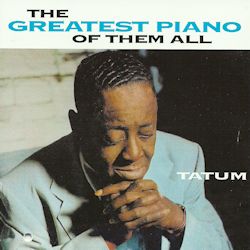1. Deep Purple
2 Somebody Loves me
3. I Didn’t Know What Time It Was
4. What’s New?
5. You’re Blasé
6. You’re Mine, You
7. That Old Feeling
8. Heat Wave
9. She’s Funny That Way
10. Stars Fell on Alabama
11. Blue Moon
12. There’s a Small Hotel
13. Caravan
14. The Way You Look Tonight
15. You Go to My Head
16. Lover, Come Back to Me
Art Tatum – Piano
Many musicians and critics have agreed with the assessment of Art Tatum summarized in the title of this album. Yet for several years from the late 1940s,
he was hardly ever invited to make any studio recordings. Norman Granz put this right in 1953 by signing Tatum up for a mass of recording sessions: both
solo and with ensembles. Between December 1953 and January 1955, Art recorded 120 solos, which were issued on 14 LPs. Granz continued making recordings
with Tatum and some top-class musicians close to the time when Art died in November 1956, aged only 47.
This CD is a reissue of the session on 22 April, 1954, with the added bonus of seven tracks from the same session which were not included on the original
LP. When I reviewed another collection of Tatum recordings, I characterised his playing for “the continual runs, the harmonic variations, the rhythmic
daring, the driving stride and also a tongue-in-cheek humour which often took astounding liberties with tunes”.
Take, for instance, his interpretation of That Old Feeling, which starts with a long, almost classical introduction. In fact I sense in many of
these recordings that Tatum was closer to a classical pianist than a jazz player. His statement of the theme of this song and the subsequent improvisations
sound like a “Theme and Variations” by many a classical composer. Tatum only adopts a gentle four-in-a-bar rhythm after three-and-a-half minutes, and he
often interrupts the beat so as to insert some decorative arpeggios, a series of punctuating chords, or a puckish interlude of some other sort.
The following Heat Wave illustrates the jazzier side of Tatum, full of harmonic variation and eventually sliding into stride piano mode,
interspersed with those typical runs. Just these two tracks alone present us with a unique musician whose technique allowed him to play in a more
adventurous manner than any of his contemporaries could achieve.
I presume that the bonus tracks were omitted from the original LP through limitations of time, but a track like Caravan displays an equally
astonishing artist. Tatum maintains a strong rhythm in the left hand while his right hand plays more tricks than you can count. The rhapsodic Way You Look Tonight reinforces the view of Tatum as a classical pianist in a beer-drinker’s body. Here and elsewhere, Art frequently gets away
from the beat so as to add some ornamentation which holds up the rhythm, although one can sense the beat still there.
Art Tatum was a genius whose piano playing surpassed what anyone else could achieve – then and subsequently.
Tony Augarde
www.augardebooks.co.uk
